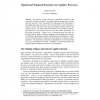Free Online Productivity Tools
i2Speak
i2Symbol
i2OCR
iTex2Img
iWeb2Print
iWeb2Shot
i2Type
iPdf2Split
iPdf2Merge
i2Bopomofo
i2Arabic
i2Style
i2Image
i2PDF
iLatex2Rtf
Sci2ools
101
click to vote
BIRTHDAY
1997
Springer
1997
Springer
Spatial and Temporal Structures in Cognitive Processes
The structures of space and time are identified as essential for the realization of cognitive systems. It is suggested that the omnipresence of space and time may have been responsible for neglecting these dimensions in knowledge processing in the past. The evolving interest in space and time in cognitive science and some of the current conceptions of space and time are briefly reviewed. It is argued that space and time not only structure cognitive representations and processes but also provide useful information for knowledge processing. Various ways of structuring space and time are discussed and the merits of different languages for describing space and time are addressed. In particular, qualitative and quantitative descriptions are related to local and global reference frames and crisp qualities are related to fuzzy quantities. The importance of selecting an appropriate level of interpretation for a given description is stressed. Examples of interpreting spatial and temporal object...
Related Content
| Added | 07 Aug 2010 |
| Updated | 07 Aug 2010 |
| Type | Conference |
| Year | 1997 |
| Where | BIRTHDAY |
| Authors | Christian Freksa |
Comments (0)

